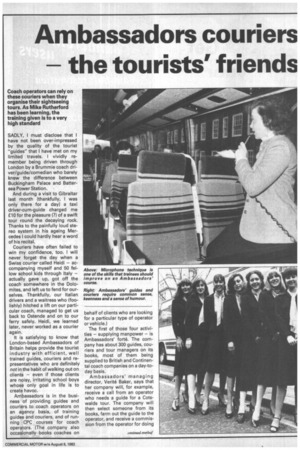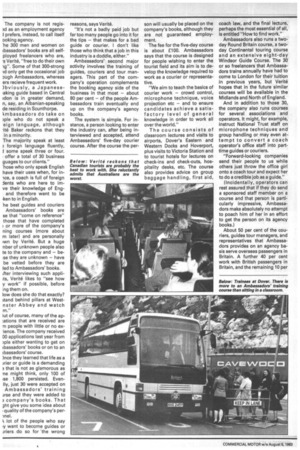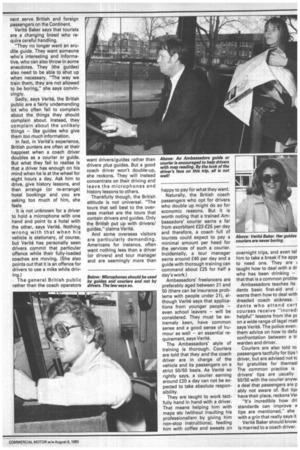Ambassadors couriers the tourists' friends
Page 61

Page 62

Page 63

If you've noticed an error in this article please click here to report it so we can fix it.
SADLY, I must disclose that I have not been over-impressed by the quality of the tourist "guides" that I have met on my limited travels. I vividly remember being driven through London by a Brummie coach driver/guide/comedian who barely knew the difference between Buckingham Palace and Battersea Power Station.
And during a visit to Gibraltar last month (thankfully, I was only there for a day) a taxi driver-cum-guide charged me 0 for the pleasure (?) of a swift tour round the decaying rock. Thanks to the painfully loud stereo system in his ageing Mercedes I could hardly hear a word of his recital.
Couriers have often failed to win my confidence, too. I will never forget the day when a Swiss courier called Heidi — accompanying myself and 50 fellow school kids through Italy — actually gave up, got off the coach somewhere in the Dolomites, and left us to fend for ourselves. Thankfully, our Italian drivers and a waitress who (foolishly) hitched a lift on our particular coach, managed to get us back to Ostende and on to our ferry safely. Heidi, we learned later, never worked as a courier again.
It is satisfying to know that London-based Ambassadors of Britain helps provide the tourist industry with efficient, well trained guides, couriers and representatives who are definitely not in the habit of walking out on clients — even if those clients are noisy, irritating school boys whose only goal in life is to create havoc.
Ambassadors is in the business of providing guides and couriers to coach operators on an agency basis, of training guides and couriers, and of running CPC courses for coach operators. (The company also occasionally books coaches on behalf of clients who are looking for a particular type of operator or vehicle.) The first of those four activities — supplying manpower — is Ambassadors' forte. The company has about 300 guides, couriers and tour managers on its books, most of them being supplied to British and Continental coach companies on a day-today basis.
Ambassadors' managing director, Verite Baker, says that her company will, for example, receive a call from an operator who needs a guide for a Cotswelds tour. The company will then select someone from its books, farm out the guide to the operator, and receive a commission from the operator for doing The company is not regisK1 as an employment agency i prefers, instead, to call itself poking agency.
he 300 men and women on ibassadors' books are all selfcloyed freelancers who are, Verite, "free to do their own lg". Some of that 300-strong Id only get the occasional job Dugh Ambassadors, whereas ers reci eve frequent work. )bviously, a Japaneseaking guide based in Central idon is in greater demand, n, say, an Albanian-speaking de residing in Scunthorpe. kmbassadors do take on )ple who do not speak a eign language, although Ito" Baker reckons that they in a minority.
The majority speak at least ) foreign language fluently, some speak three or four.
offer a total of 30 business guages to our clients."
'hose who only speak English have their uses when, for inice, a coach is full of foreign dents who are here to im ye their knowledge of Eng and therefore want to be Iken to in English.
he best guides and couriers Ambassadors' books are se that "come on reference" those that have completed or more of the company's ning courses (more about m later) and are personally iwn by Verite. But a huge nber of unknown people also te to the company and — bese they are unknown — have be vetted before they are led to Ambassadors' books. ,fter interviewing such appli Verite likes to "see how y work" if possible, before Ing them on.
low does she do that exactly? Aand behind pillars at Westnster Abbey and watch m."
lut of course, many of the ap:ations that are received are -r) people with little or no exience. The company received 00 applications last year from aple either wanting to get on ibassadors' books or on to an ibassadors' course.
)(Ice they learned that life as a icier or guide is a demanding 3 that is not as glamorous as ne might think, only 100 of rse 1,800 persisted. EvenIly, just 30 were accepted on
Ambassadors' training ffse and they were added to ) company's books. That ght give you some idea about quality of the company's perinel.
k lot of the people who say y want to become guides or Ariers do so for 'the wrong reasons, says Verite.
"It's not a badly paid job but far too many people go into it for the tips — that makes for a bad guide or courier. I don't like those who think that a job in this industry is a doddle, either."
Ambassadors' second major activity involves the training of guides, couriers and tour managers. This part of the company's operation complements the booking agency side of the business in that most — about BO per cent — of the people Ambassadors train eventually end up on the company's agency books.
The system is simple. For instance, a person looking to enter the industry can, after being interviewed and accepted, attend Ambassadors' five-day courier course. After the course the per son will usually be placed on the company's books, although they are not guaranteed employment.
The fee for the five-day course is about E100. Ambassadors says that the course is designed for people wishing to enter the tourist field and its aim is to develop the knowledge required to work as a courier or representative.
"We aim to teach the basics of courier work — crowd control, microphone technique, voice projection etc — and to ensure candidates achieve a satisfactory level of general knowledge in order to work all over the world."
The course consists of classroom lectures and visits to airports, Dover's Eastern and Western Docks and Hoverport, plus visits to Victoria Station and to tourist hotels for lectures on check-ins and check-outs, hospitality desks, etc. The course also provides advice on group baggage handling, first aid, coach law, and the final lecture, perhaps the most essential of all, is entitled "How to find work."
Ambassadors also runs a twoday Round Britain course, a twoday Continental touring course and an extensive eight-day Windsor Guide Course. The 30 or so freelancers that Ambassadors trains annually have had to come to London for their tuition in previous years, but Verite hopes that in the future similar courses will be available in the Midlands and North of England.
And in addition to those 30, the company also runs courses for several associations and operators. It might, for example, instruct National Trust staff on microphone techniques and group handling or may even attempt to convert a coach operator's office staff into parttime guides or couriers.
"Forward-looking companies send their people to us while others just throw the office girl onto a coach tour and expect her to do a credible job as a guide."
(Incidentally, operators can rest assured that if they do send a sponsored staff member on a course and that person is particularly impressive, Ambassadors make absolutely no attempt to poach him of her in an effort to get the person on its agency books.) About 50 per cent of the couriers, guides tour managers, and representatives that Ambassadors provides on an agency basis serve overseas passengers in Britain. A further 40 per cent work with British passengers in Britain, and the remaining 10 per cent serve British and foreign passengers on the Continent.
Verite Baker says that tourists are a changing breed who require careful handling.
"They no longer want an erudite guide. They want someone who's interesting and informative, who can also throw in some anecdotes. They (the guides) also need to be able to shut up when necessary. "The way we train them, they are not allowed to be boring," she says convincingly.
Sadly, says Verite, the British public are a fairly undemanding lot who often fail to complain about the things they should complain about. Instead, they complain about the unlikely things — like guides who give them too much information.
In fact, in Verite's experience, British punters are often at their happiest when a coach driver doubles as a courier or guide. But what they fail to realise is that a driver has enough on his mind when he is at the wheel for eight hours a day. Ask him to drive, give history lessons, and then arrange (or re-arrange) hotel bookings and you are asking too much of him, she feels It is not unknown for a driver to hold a microphone with one hand and point to a hotel with the other, says Verite. Nothing wrong with that when his vehicle is stationary, of course, but Verite has personally seen drivers commit that particular offence while their fully-loaded coaches are moving. (She also points out that it is an offence for drivers to use a mike while driving.) The general British public rather than the coach operators want drivers/guides rather than drivers plus guides. But a good coach driver won't double-up, she reckons. They will instead concentrate on their driving and leave the microphones and history lessons to others.
Thankfully though, the British attitude is not universal. "The tours that sell best to the overseas market are the tours that contain drivers and guides. Only the British put up with drivers/ guides," claims Verite.
And some overseas visitors are particularly demanding. Americans for instance, often want nothing less than a driver (or drivers) and tour manager and are seemingly more than happy to pay for what they want.
Naturally, the British coach passengers who opt for drivers who double up might do so for economic reasons. But it is worth noting that a trained Ambassadors' courier earns a far from exorbitant £22-£25 per day and therefore, a coach full of tourists could expect to pay a minimal amount per head for the services of such a courier. Incidentally, a tour manager earns around £40 per day and a guide with thorough training can command about £25 for half a day's work.) Ambassadors' freelancers are preferably aged between 21 and 50 (there can be insurance problems with people under 21), although Verite says that applications from younger people — even school leavers — will be considered. They must be extremely keen, have common sense and a good sense of humour as well — an essential requirement, says Verite.
The Ambassadors' style of training is thorough. Couriers are told that they and the coach driver are in charge of the vehicle and its passengers on a strict 50/50 basis. As Verite so rightly says, a courier earning around £20 a day can not be expected to take absolute responsibility.
They are taught to work tactfully hand in hand with a driver. That means helping him with maps etc (without insulting his professionalism by giving him non-stop instructions), feeding him with coffee and sweets on overnight trips, and even tel him to take a break if he appE to need one. They are r taught how to deal with a dr who has been drinking — that that is a common problei Ambassadors teaches its dents basic first-aid and warns them how to deal with dreaded coach sickness. dents who attend cert courses receive "incredi helpful" lessons from the pc on a wide range of legal mati says Verite. The police even them advice on how to defu confrontation between a tr. warden and driver.
Couriers are also told to passengers tactfully for tips I driver, but are advised not tc for gratuities for themsel The common practice is drivers' tips are usually 50/50 with the courier any= a deal that passengers are p ably not aware of. But tip: have their place, reckons Ver "It's incredible how dri standards can improve v tips are mentioned," she with a grin that really says it Verite Baker should know. is married to a coach driver.
































































































